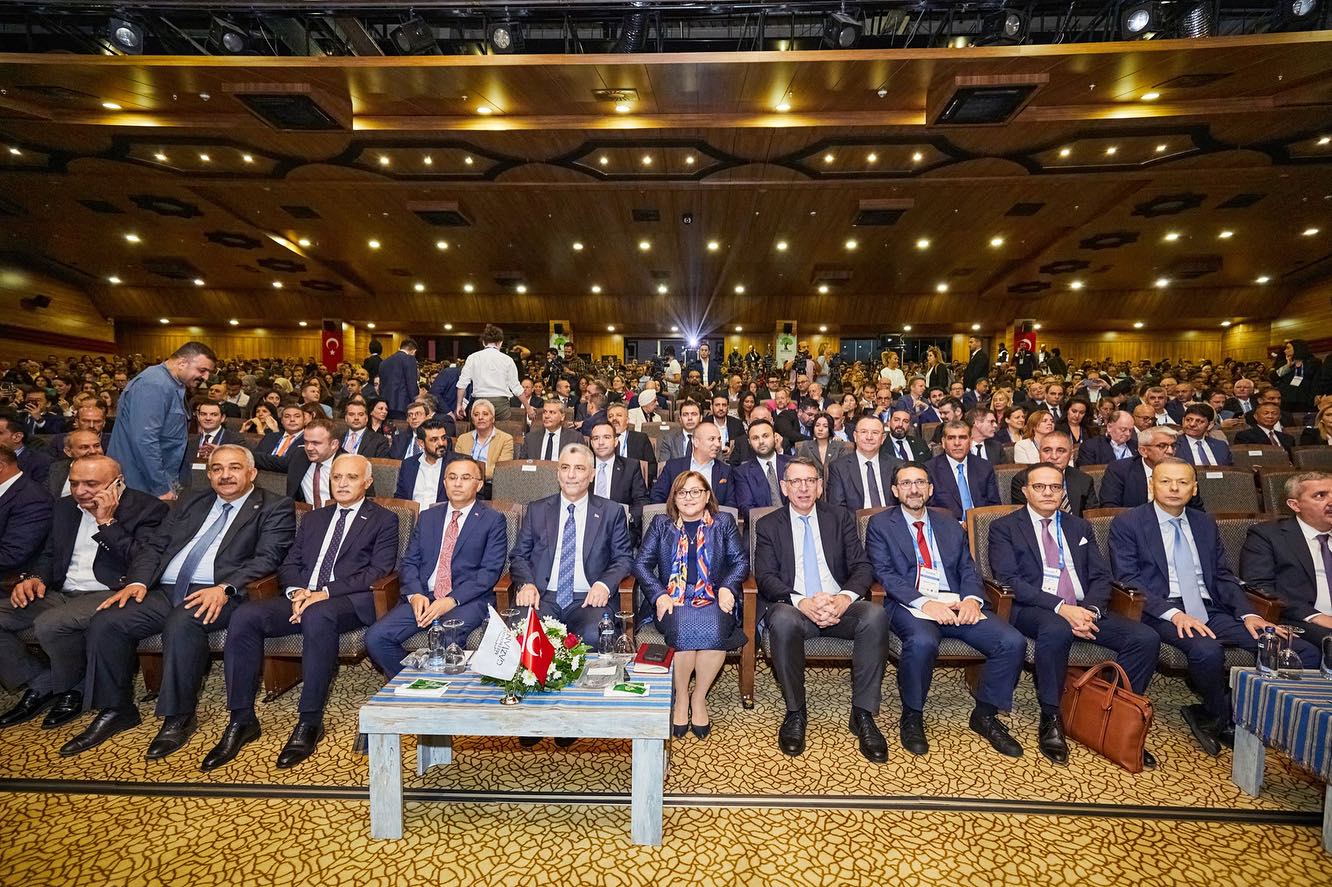Summary of the 2023 Horasis Global Meeting, Gaziantep, Türkiye, 22-23 October
The eighth Horasis Global Meeting took place in Gaziantep, Türkiye over 22-23 October 2023, co-hosted by the City of Gaziantep. The co-hosting city may be thought of as the center civilization as it was a center of learning and commerce in the Mesopotamian era with its development, innovation and trade continuing to the present day. The geolocation of Türkiye ensured that Gaziantep both thrived under many different rulers, and most recently the Ottomans giving rise to modern Türkiye.
Earlier this year, Gaziantep was struck by a major earthquake and just prior to the Horasis Global Meeting a war broke out between Israel and Hamas in the Gaza strip, which might become a Middle East flash point leading to a longer series of confrontations. This confrontation occupied parts of the panel’s discussions as did the earlier incursion upon Ukraine by Russia from February 2022. These wars were mentioned by participants as readings of the general global unease and the fracturing of globalization.
From the outset, Fatma Şahin, Mayor of Gaziantep, Türkiye was praised in so far as it was evident that her leadership and support have been instrumental in hosting this event, especially in the wake of February’s earthquakes. Her words resonate with hope and a unified vision for leveraging innovative technologies in a journey towards reconstruction and resilience. Ömer Bolat, Minister of Trade, Türkiye said that every time he visited Gaziantep he saw progress, development and an uprising of new buildings.
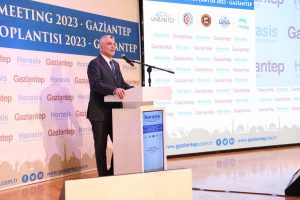
Ömer Bolat, Minister of Trade, Türkiye
The meeting’s theme was Creating Impact with Innovation, Sustainability and Reconstruction and drew delegates from round the world to contribute to panel and to plenary discussions. Discussions often focused on the aftermath of the earthquakes, geopolitical distortions, upon the continuing mutations of the COVID virus its costs and future control; and the world’s continuing economic uncertainty, inflation and energy shortages.
Geopolitics and its immediate consequences leave us all in food and water crises, and it is the poor around the globe who suffer the most.
Minister of Treasury and Finance Mehmet Şimşek emphasized that Türkiye is carefully introducing beneficial fiscal and economic policies that look well beyond the immediacy of rebuilding the earthquake damage. This is creating a stronger business outlook based on the country’s business culture which has deep historical roots.
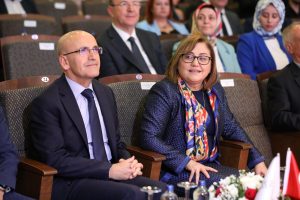
Finance Minister Mehmet Şimşek and Mayor Fatma Şahin
Turning to the need to Improving the World under Stress, Bjørn Berge, Deputy Secretary General, Council of Europe, France emphasized the necessity of working together to solve the huge global challenges that the global community face today, such as the Russian invasion of Ukraine, climate change, Artificial Intelligence and democratic backsliding. Specifically, said Mehmet Kemal Bozay, Deputy Minister of Foreign Affairs, Türkiye, we need to work on finding synchronism with the EU: Türkiye is the gatekeeper so we need to strengthen our relationship. While Senida Mesi, Former Deputy Prime Minister, Albania advised caution asking we don’t forget the low-income nations. The Turkish Foreign Economic Relations Board (DEİK) President Nail Olpak touched upon the changing paradigms with COVID-19 and the Russia-Ukraine war. Rhett Power, Forbes Columnist & Chief Executive Officer, Accountability Inc, USA felt a consistent theme had emerged throughout the extensive discussions on global and regional challenges: this was hope.
Speaking to the plenary on the World Economic Outlook, Ahmet Fikret Kileci, Chairman, Southeast Anatolian Exporters’ Associations, Türkiye espoused that international dialogue must be extended to broad vistas to develop peace and tolerance with better collaboration within science, education, culture and the Arts to narrow the gap between developed and developing countries. And speaking of rebuilding, Adil Sani Konukoğlu, Chairman, Sanko Holding, Türkiye explained that while presently inflation exploded in the smallest incident, but we must make the world livable by green transformation and reducing the carbon footprint. While Emily Slater, Executive Director, Bretton Woods Committee, USA, looked more broadly stating that the IMF and the World Bank should support the Turkish crisis with loans during this period. However, she added, that central banks only plan according to local conditions in reducing inflation, and that it is difficult to achieve a decrease in inflation because they do not look at the global outlook. Mehmet Tuncay Yıldırım, Gaziantep Chamber of Commerce, Türkiye added that he sees a silver lining – the current economic distortion will bring gains that should strengthen the Turkish and the global economy in the long run. In conclusion Pranjal Sharma, Contributing Editor, Business Standard, India, chairing the plenary, said that countries will need to move beyond self-interest and look to their neighbors for sustained economic growth.
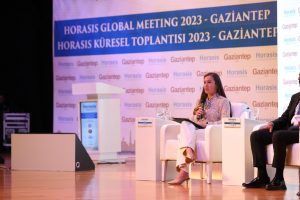
Emily Slater, Executive Director, Bretton Woods Committee, USA
Under the theme of Cooperating to Revitalize and Rebuild Cities, Fatma Varank, Deputy Minister of Environment, Urbanization and Climate Change, Türkiye emphasized the importance of digitalization in revitalizing cities hurt by natural disasters.
A plenary on Embracing Social Capitalism was chaired by Ben Nelson, Chairman and Chief Executive Officer, Minerva Project, USA who remined delegates that Minerva’s goal was to nurture critical wisdom through systematic evidence-based learning to reinvent higher learning. Gligor Tashkovich, Former Minister for Foreign Investment, North Macedonia said it was helpful, if you are an entrepreneur, it is important to work in a country where enduring respect for the rule of law is maintained, Tashkovich emphasized. “Otherwise, if you run into a local business dispute, you probably will not have it resolved fairly.” And deep collaboration is one way to achieve lasting results suggested Demet Sabanci, Chairwoman, Shopsa, Türkiye who found the excellent partnership and professionalism came from collaboration with INNO and the North West Regional Development Agency. Sentiments supported by Josef Stadler, Vice Chairman, UBS, Switzerland who declared we need to see high levels of collaboration to have any chance of tackling the alarming environmental and societal challenges that face humankind. Sekai Holland, Chairperson of Board of Trustees, Zimbabwe Peacebuilding Initiative; Former Minister of State for National Healing, Reconciliation and Integration, Zimbabwe concluded the panel by calling on participants to embrace a capitalism that is highly inclusive, serving the people.
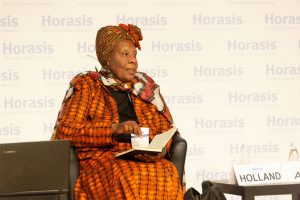
Sekai Holland, assessing the state of the world
Similar sentiments were taken up in the plenary panel discussion ESG as a Sine-qua-non with Eelco van der Enden, Chief Executive Officer, Global Reporting Initiative (GRI), Belgium being supportive, noting “ESG has gone from a marketing gimmick to now being an essential component of corporate strategy”. Especially as global investment for impact has increased from €4 billion to nearly €50 billion in recent years, according to the Global Impact Investing Network (GIIN) and Dealroom, an increasing rate of more than 16% per year. Bo Inge Andersson, Chief Executive Officer, Uzauto Motors, Uzbekistan said the worldwide ESG rules challenge and offer opportunities and noted four very personal guidelines that have remained his guiding star applying not only to sustainability but also to operating and growing a healthy organization. Such thoughts were noted by Adnan Hashim, Group Chief Financial Officer, Gulf Air Group, Bahrain “The aviation industry is in a good position in terms of ESG but it is held back somewhat by the current state of technology. We’ve all heard the arguments for EVs but this doesn’t yet translate to aircraft in the same way. SAF, a proposed fuel, is three times more expensive than regular fuel, for example.” Bora Isbulan, Deputy Chief Executive Officer, Plaza Premium Group, Hong Kong SAR operates the world’s largest network of airport lounges, “we cannot ignore the realization of ESG rules. They become pervasive in the way we work.” This Plenary was chaired by Girish Ramachandran, President Asia Pacific, TCS, Singapore who fully endorsed the plenary delegates who agree the need for ESG standards and concurring with them in their respective roles.
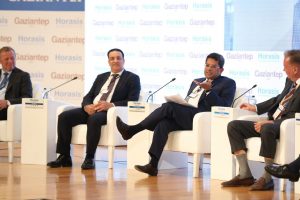
Girish Ramachandran, President Asia Pacific, TCS, Singapore
Renita Kalhorn, Forbes Contributor and High-EQ Leadership Coach, France chaired the closing summary plenary panel on Creating Impact was hopeful that one of the things that will remain from this meeting is that we still have the chance to work together. Emrah Baydemir, Deputy Director General, İlbank, Türkiye stressed that the primary goal of purpose-driven corporations shall be to build a successful business and make a positive difference in the world. Fahim Hashimi, Chairman, Hashimi Group; Former Minister of Communications and Information Technology, Afghanistan, was clear “We need agile, bionic structures where we can communicate clearly to create sustainable impact for countries through technology.” Rajeev Peshawaria, Chief Executive Officer, Stewardship Asia Centre, Singapore affirmed the values-based movement has indeed started “the world is slowly but surely realizing that force, regulation, and incentives are not the only answers to today’s existential challenges. We humans are capable of rising together to defeat climate change, social inequality, and the threats of tech misuse.” Catherine Carlton, Founder and Chief Executive Officer, Sapiens Impact, USA added: “We need to alter our values to collaborate and not be in conflict; believe in interdependence rather than self-interest; stress innovation; and have a long-term view, not short-term and search for values-based actions that maximizes the good and reject regulation that maximizes the bad”. Murat Seitnepesov, Chairman, Integral Group, Switzerland, demonstrates purpose-driven leadership, serving on the International Board of EurAsia Heart Foundation, and also leading the GSPDX project, which stands for Global System for Preparedness for Disease X. This initiative promotes a new, systemic approach for preparedness for future pandemics focusing on the detection of new dangerous pathogens in the earliest possible stage using modern digital technologies. This could, indeed, create impact.
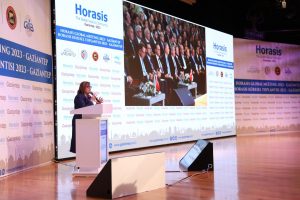
Fatma Şahin, Mayor of Gaziantep, Türkiye, welcoming participants
Fatma Şahin, Mayor of Gaziantep, Türkiye finally raised hope for all “Gaziantep, with its ancient places, is the world’s yesterday. These days, when we need social justice and social peace more, we need to protect and use our planet, which is our common home. We cannot leave a future to our grandchildren a world which we have used cruelty. That’s why Gaziantep is the center of sweat and the future of hope”.
On behalf of Horasis, I would like to personally thank Mayor Fatma Şahin and all delegates for their efforts in contributing to the constructive dialogue as cornerstone to inspiring our future. The 2023 Horasis Global Meeting was a unique experience which would not have been possible without the dedication and enthusiasm of our partners from Gaziantep, Türkiye and the world.
Horasis looks forward to welcoming you again next year to an equally fruitful edition of the Horasis Global Meeting.
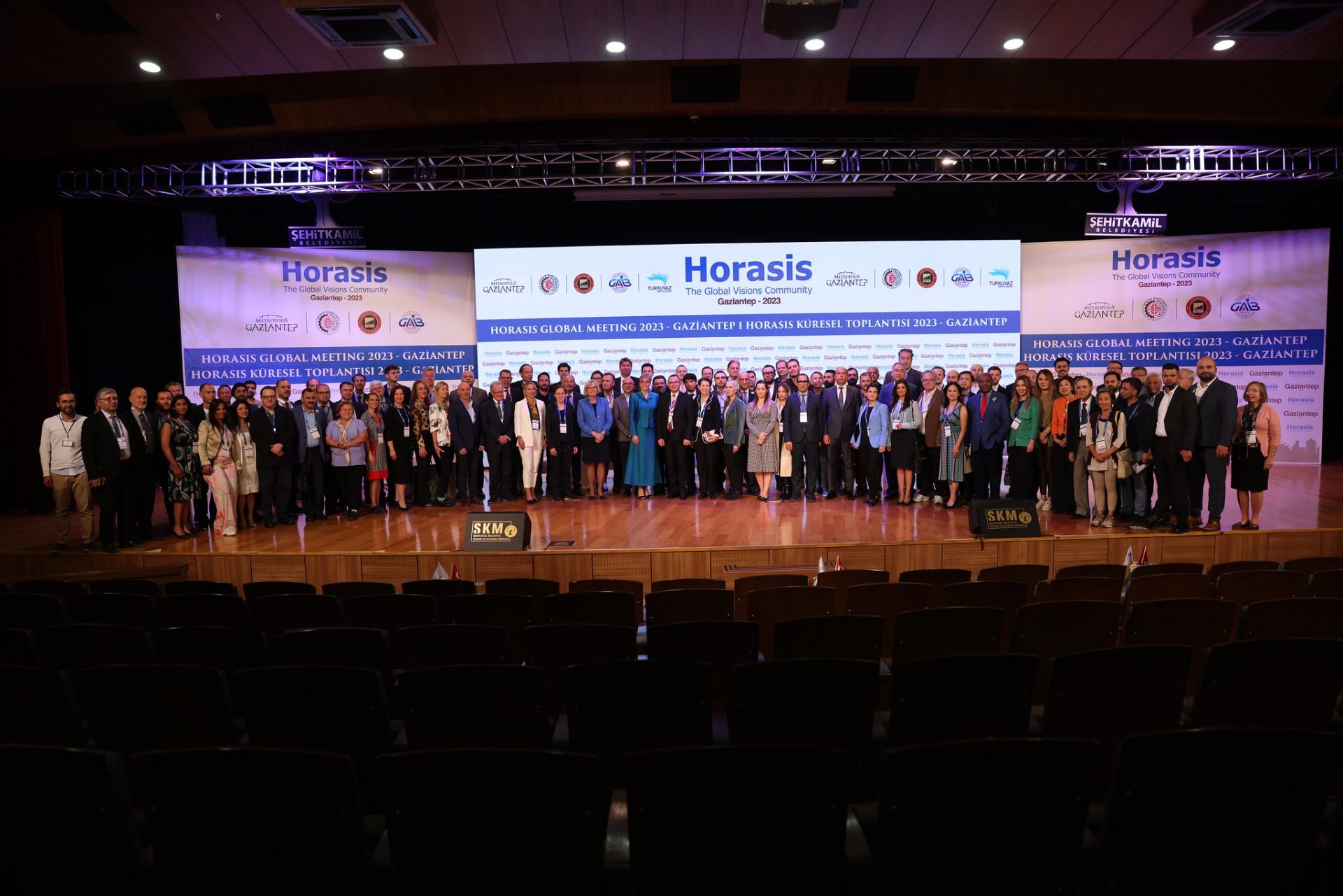
Some participants gather on the stage, after a long working day
